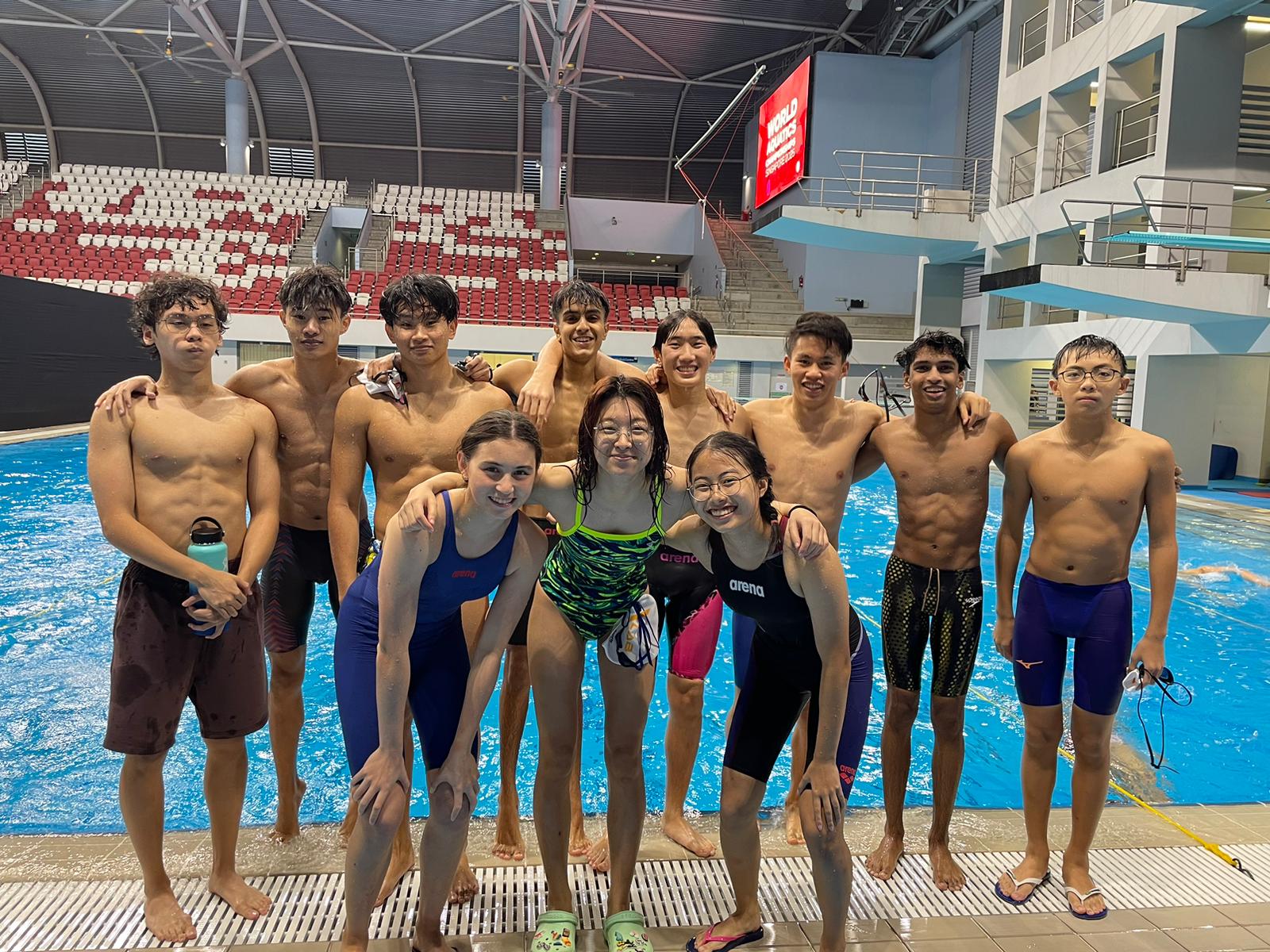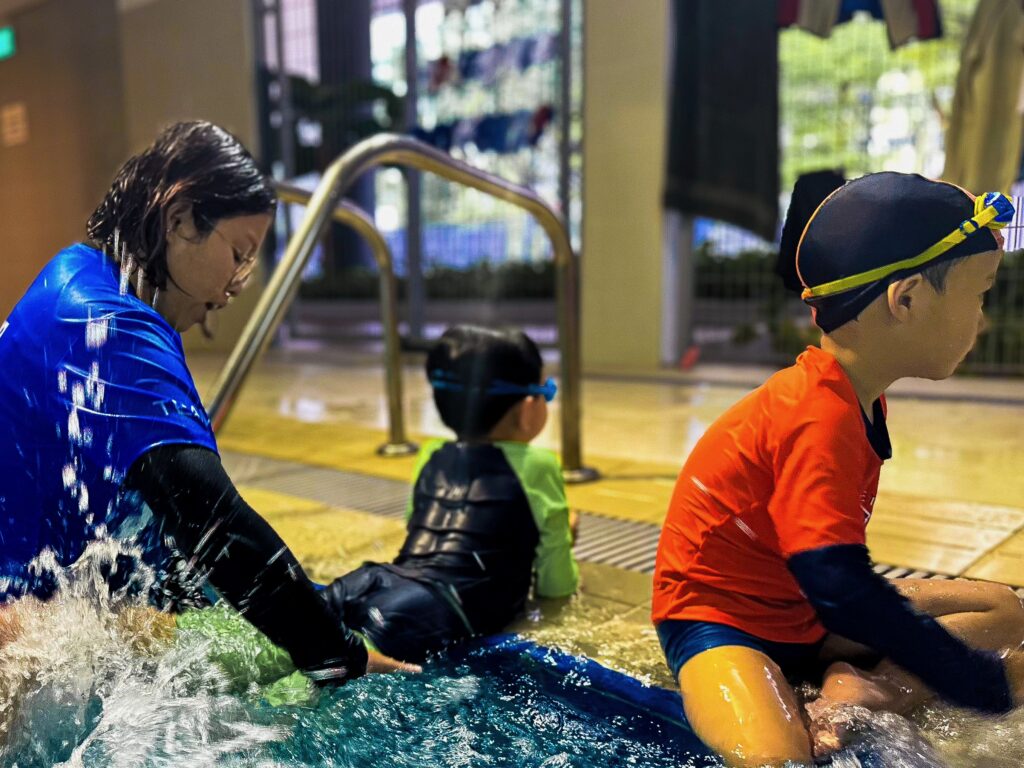Building Confidence in the Water: Comprehensive Swim Lessons for Toddlers to Preteens
From First Splash to Strong Swimmer
Getting ready to help your child make a splash in the pool? Whether your little one is just starting to blow bubbles or already racing across the shallow end, swim lessons are the key to building confidence and essential skills that last a lifetime! From toddlers to preteens, learning to swim isn’t just about having fun in the water – it’s a developmental milestone that boosts both emotional and physical growth.
Early exposure to swimming works wonders for building lifelong confidence, especially when it comes to water safety, coordination and strength. When kids start swimming at a young age, they naturally become more comfortable and familiar with the water. This familiarity is key to water safety – it helps them instinctively know how to react in different aquatic environments, whether they’re in a pool, lake or even the ocean.
It’s not just about safety. Swimming is also one of the best ways to develop coordination at an early age. The act of synchronising arm movements, kicking, and breathing teaches body awareness and balance, skills that extend beyond the pool. As they progress through various swimming strokes, they build both upper and lower body strength, which supports their overall physical development.
This combination of safety awareness, physical coordination, and strength becomes second nature, giving them the confidence to not only enjoy the water but thrive in it. Over time, this translates to greater self-assurance, not just in swimming, but in other areas of life where facing challenges head-on is required. The early swim lessons are really laying the groundwork for a lifetime of confidence both in and out of the water.
Making Waves Early: Laying the Groundwork for Future Competitive Swimming
Structured swim lessons teach toddlers how to swim, but also lay the foundation for potential future competitive swimmers. While your child may be far from racing laps, the early water confidence built from early exposure and motor skills developed are the beginnings of key swimming techniques that could one day lead to a competitive edge.
At toddler age, it’s all about making the water a fun and familiar place. Swim classes for toddlers focus on boosting water confidence by encouraging submersion, floating and basic motor skills like kicking and reaching. These skills are the building blocks for learning basic strokes and water safety, giving toddlers a head start in their swimming journey.
The beauty of toddler swim lessons lies in their playful approach – games and activities make learning effective and enjoyable. For example, using brightly coloured toys to practice floating or incorporating fun songs and splashing exercises. Hearing Humpty Dumpty, Hokey Pokey and I’m a Little Teapot by the poolside of toddler classes are common to introduce play and water submersion. Singing, combined with skillful coaches, often prove effective in breaking the barrier between water and young children.
Games such as treasure hunting are a coaches favourite to encourage simple movements in the water and red light, green light work on kicking movements without them realising it!
As they gain confidence in the water, these seemingly simple lessons prepare them for more advanced skills down the line, creating a solid foundation that can evolve into competitive swimming.
Kicking It Up a Notch: Advancing Skills and Endurance for Early School-Age Swimmers (6-9 years)
As children enter the early school-age of 6 to 9 years, swimming classes for kids evolve to focus on enhancing coordination and endurance. At this age, kids move beyond the basics they learned during toddler swimming development and take on more complex drills designed to fine-tune their skills. Whether it’s improving their stroke technique or mastering the rhythm of breathing, these swimming lessons for kids challenge them to be more coordinated and efficient in the water.
This phase also introduces exciting advanced skills like diving and swimming longer distances, which helps to gradually build their stamina. Kicking with a kickboard over extended distance is a simple way to build cardiovascular ability and incorporate endurance training into a swim lesson. Building this endurance is essential in working towards learning to swim for longer distances and extended periods without tiring, preparing them for more competitive environments down the road. These developments in both skill and confidence ensure that kids not only enjoy their time in the pool but also continue progressing towards their swimming goals.

Taking the Plunge: Stroke Refinement and Endurance in Preteen Swimming Milestones
As preteens between the age of 10 and 12 dive deeper into their swimming journey, the focus shifts to swimming longer distances and refining their strokes. This is a crucial developmental stage where young swimmers learn to train effectively through structured swimming classes for kids, making significant strides toward mastery of their skills.
Stroke refining during these years involves breaking down each swimming stroke into its key components, from body position to legs, arms and breathing elements, allowing swimmers to enhance their technique systematically. For instance, during freestyle, preteens learn to optimise their arm movements for maximum reach while maintaining a streamlined body position. They also start to work on their kick efficiency, ensuring it propels them forward without creating excess drag. By working on these details, swimmers can significantly increase their speed and reduce resistance in the water, which is vital for competitive swimming.
Physical milestones become more pronounced as well, with swimmers noticing improvements in their overall strength and endurance. As they tackle longer distances, their training routines might include interval training or distance sets, which help build cardiovascular fitness and stamina. These sets often prove more challenging but are essential and prepares them for entry-level competitions and reinforces the foundational skills developed in earlier swim classes for toddlers and preteens. Ultimately, this instills a sense of confidence and accomplishment in their abilities.
In the process of swim skills refining, your child will enter the phase of learning to train* and train to train, which is a pivotal transition from the active for life stage. These 2 stages focus on understanding the importance of structured training sessions and developing a consistent practice routine. Swimmers begin to learn how to set personal goals, whether it’s improving their times or mastering a particular technique. They pick up swim-specific skills in the process and start building more than just foundational skills.
Your child will start to grasp the significance of warming up and cooling down, injury prevention and proper nutrition to fuel their bodies for optimal performance. Coaches often introduce more complex drills that focus on endurance, speed and technique, encouraging swimmers to take ownership of their training. This empowerment fosters a greater commitment to the sport, as preteens become more aware of what it takes to excel in swimming.
With the solid training foundation, swimmers transition into the train to compete phase. This stage involves preparing for competitive events and understanding the mental aspects of racing, such as visualisation techniques and race-day strategies. During this phase, swimmers practice pacing themselves over longer distances, develop effective starts and turns, and work on race strategies that leverage their strengths.
Coaches help them analyse their performance through video feedback and time trials, allowing them to identify areas for improvement. With focused training and strategic preparation, preteens gain the confidence to compete, embrace the thrill of racing and put their skills to the test. This experience not only enhances their swimming capabilities but also instills valuable life lessons about dedication, resilience and teamwork, laying the groundwork for a lifelong love of the sport.
*Learn to Train, Train to Train and Train to Compete are part of the Long Term Athlete Development (LTAD) frame. To read more: https://www.sportsschool.edu.sg/sports/overview
Empowering Confidence: The Essential Role of Parents in Supporting Swimming Lessons and Water Safety
The role of parents in reinforcing swimming lessons for kids and ensuring water safety cannot be overstated. As your child progresses through their swimming journey, your support is crucial in helping them build confidence and proficiency in the water. By actively participating in their learning process, you create a supportive environment that encourages your child to practice their skills outside of swim classes for toddlers or other lessons. This not only reinforces what they’ve learned in class but also instills a sense of responsibility regarding water safety.
To provide actionable support, consider incorporating regular water activities into your family’s routine. Whether it’s family swim days at the pool, trips to the beach, or simply playing in the house with an inflatable pool, consistent exposure to water helps reinforce skills learned in toddler swimming development and builds confidence. Encourage your child to practice floating, kicking and basic strokes during these outings, and make it fun by turning practice into a game.
Additionally, teaching your child about water safety is essential. Discuss the importance of never swimming alone, understanding pool rules and recognising potential hazards around water. You can also create a water safety plan together, outlining what to do in various scenarios, such as how to respond if they find themselves in a challenging situation. By being proactive and engaged, you’ll not only reinforce your child’s swimming classes for kids but also empower them to be safe and confident in the water. Your involvement can make all the difference in their swimming journey!
Making Waves for a Lifetime: The Lasting Impact of Early Swim Lessons
In conclusion, the journey through swimming lessons is a continuum that supports children from their first splashes as toddlers to more advanced skills needed in preteen years. Enrolling your child in swim classes early not only builds their confidence in the water but also lays a strong foundation for their physical and emotional development. As they progress through each stage, your encouragement and involvement play a vital role in their success.
We urge parents to prioritise swimming lessons as a critical life skill and invest in their child’s aquatic education. The long-term benefits of early enrollment in swim classes are undeniable – your child will gain essential water safety skills, improve coordination and build resilience. Whether or not they choose to pursue a competitive swimming career, the character-building aspects of swimming is truly invaluable.
So dive in and take the plunge – enrol your kids in swimming classes today and watch them flourish in the water and beyond!




